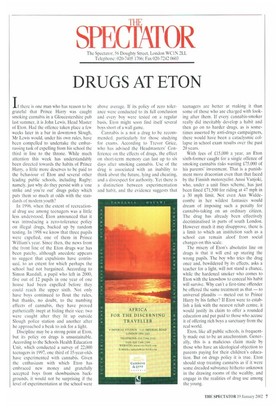DRUGS AT ETON
If there is one man who has reason to be grateful that Prince Harry was caught smoking cannabis in a Gloucestershire pub last summer, it is John Lewis, Head Master of Eton. Had the offence taken place a few weeks later in a bar in downtown Slough, Mr Lewis would, under his own rules, have been compelled to undertake the embarrassing task of expelling from his school the third in line to the throne. While much attention this week has understandably been directed towards the habits of Prince Harry, a little more deserves to be paid to the behaviour of Eton and several other leading public schools, including Rugby: namely, just why do they persist with a one strike and you're out' drugs policy which puts them so much at odds with the standards of modern youth?
In 1996, when the extent of recreational drug use among teenagers was a little less understood. Eton announced that it was introducing a zero-tolerance policy on illegal drugs, backed up by random testing. In 1998 we know that three pupils were expelled, one of them in Prince William's year. Since then, the news from the front line of the Eton drugs war has been patchy, although anecdote appears to suggest that expulsions have continued, to an extent for which perhaps the school had not bargained. According to Simon Randall, a pupil who left in 2000, five out of 12 pupils in one year of one house had been expelled before they could reach the upper sixth. Not only have boys continued to flout the rules, but thanks, no doubt, to the numbing effects of cannabis, they have proved pathetically inept at hiding their vice: two were caught after they lit up outside Slough police station and another after he approached a beak to ask for a light.
Discipline may be a strong point at Eton, but its policy on drugs is unsustainable. According to the Schools Health Education Unit, which conducted a survey of 22,000 teenagers in 1997, one third of 15-year-olds have experimented with cannabis. Given the enthusiasm with which Eton has embraced new money and gratefully accepted boys from showbusiness backgrounds, it would not be surprising if the level of experimentation at the school were above average. If its policy of zero tolerance were conducted to its full conclusion and every boy were tested on a regular basis, Eton might soon find itself several boys short of a wall game.
Cannabis is a not a drug to be recommended, particularly for those studying for exams. According to Trevor Grice, who has advised the Headmasters' Conference on the effects of drugs, the effect on short-term memory can last up to six days after smoking cannabis. Use of the drug is associated with an inability to think about the future, lying and cheating, and a disrespect for authority. Yet there is a distinction between experimentation and habit, and the evidence suggests that teenagers are better at making it than some of those who are charged with looking after them. If every cannabis-smoker really did inevitably develop a habit and then go on to harder drugs, as is sometimes asserted by anti-drugs campaigners, there would have been a cataclysmic collapse in school exam results over the past 20 years.
With fees of £15,000 a year, an Eton sixth-former caught for a single offence of smoking cannabis risks wasting 175,000 of his parents' investment. That is a punishment more draconian even than that faced by the Finnish motorcyclist Anssi Vanjoki, who, under a unit fines scheme, has just been fined /71,500 for riding at 47 mph in a 30 mph limit. Not even Ann Widdecombe in her wildest fantasies would dream of imposing such a penalty for cannabis-taking on an ordinary citizen. The drug has already been effectively decriminalised in parts of south London. However much it may disapprove, there is a limit to which an institution such as a school can remain aloof from social changes on this scale.
The misery of Eton's absolutist line on drugs is that it will end up snaring the wrong pupils. The boy who tries the drug once and, bewildered by its effects, asks a teacher for a light, will not stand a chance, while the hardened smoker who comes to Eton with the knowhow to conceal his habit will survive. Why can't a first-time offender be offered the same treatment as that — to universal plaudits — meted out to Prince Harry by his father? If Eton were to establish a link with the nearest rehab centre, it would justify its claim to offer a rounded education and put paid to those who accuse it of offering rich boys a sanctuary from the real world.
Eton, like all public schools, is frequently made out to be an anachronism. Generally, this is a malicious claim made by those who have an ideological objection to parents paying for their children's education. But on drugs policy it is true. Eton should stop treating cannabis as if it were some dreaded substance hitherto unknown in the drawing rooms of the wealthy, and engage in the realities of drug use among the young.






























































 Previous page
Previous page